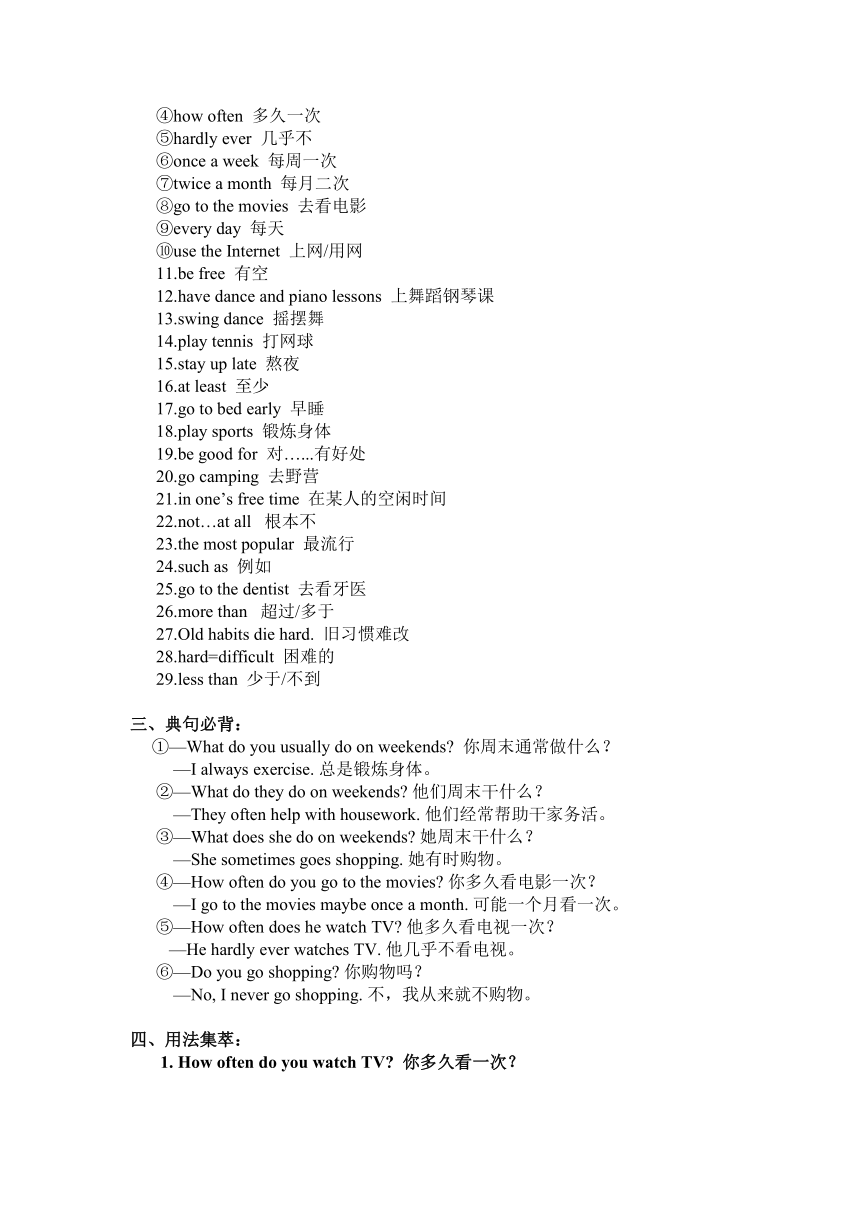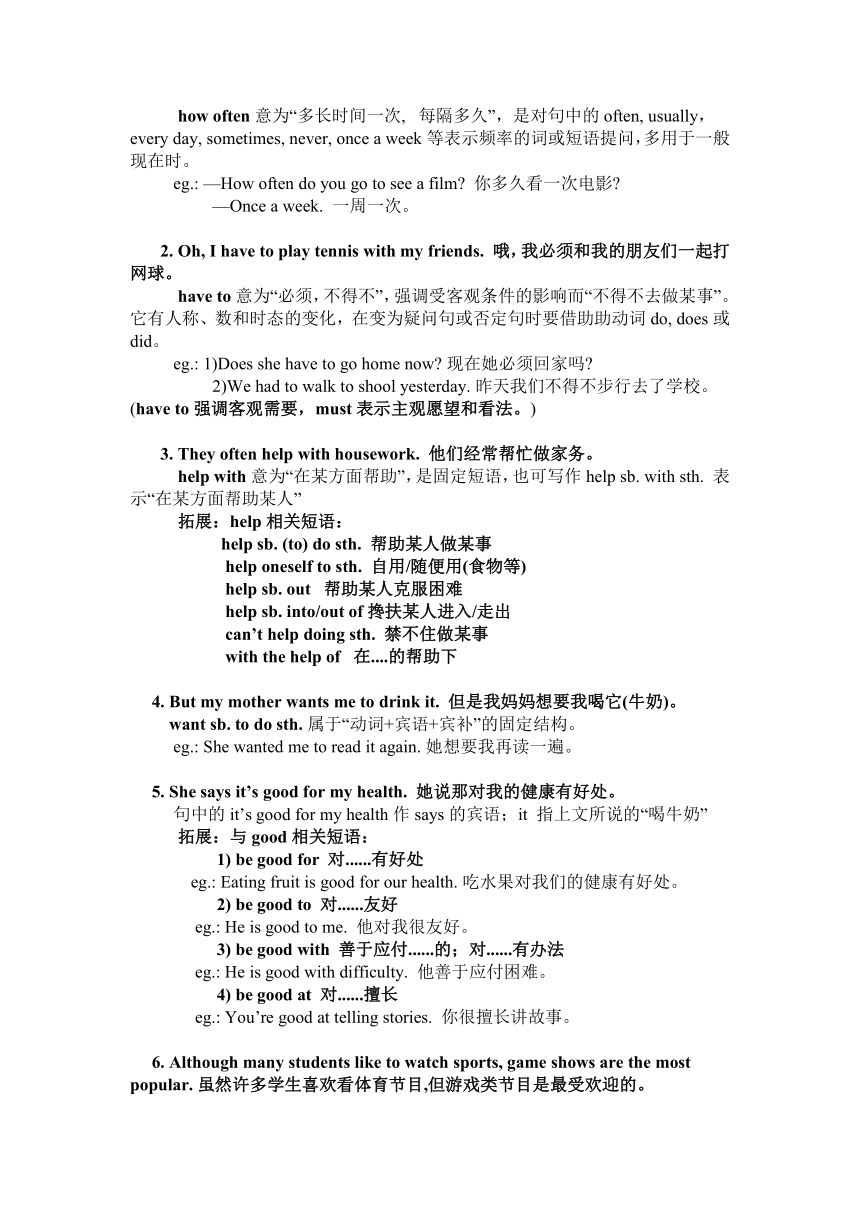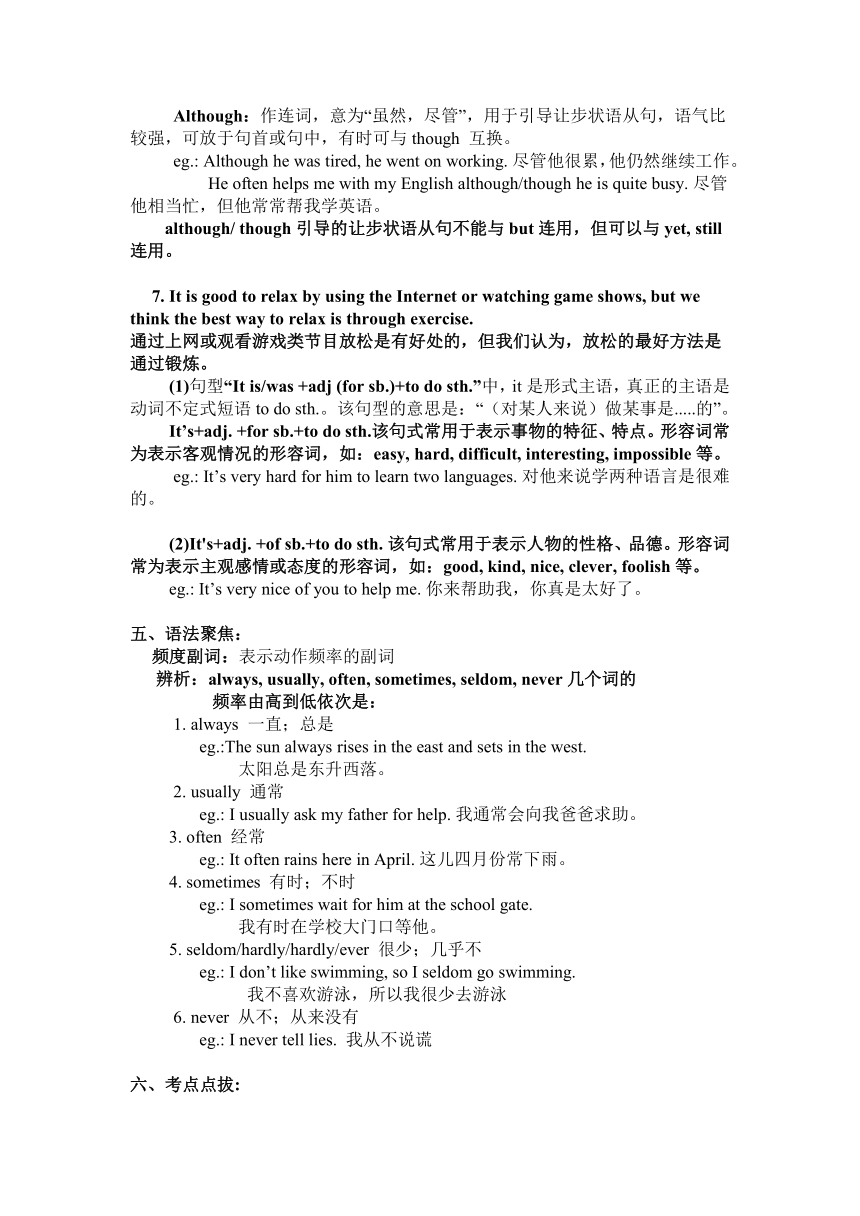人教版八年级上册 Unit 2 How often do you exercise? 词汇 短语 句型 语法重难点 写作总结
文档属性
| 名称 | 人教版八年级上册 Unit 2 How often do you exercise? 词汇 短语 句型 语法重难点 写作总结 |

|
|
| 格式 | docx | ||
| 文件大小 | 27.4KB | ||
| 资源类型 | 教案 | ||
| 版本资源 | 人教新目标(Go for it)版 | ||
| 科目 | 英语 | ||
| 更新时间 | 2024-10-12 00:00:00 | ||
图片预览




文档简介
人教版英语八年级上——Unit2词汇+短语+句型+语法/重难点+写作
一、构词法:
1.名词+y构成形容词:
sun(太阳) → sunny (阳光灿烂的)
rain(雨水) → rainy (多雨的)
wind(风) → windy (多风的,风大的)
cloud(云) → cloudy (多云的,阴天的)
snow(雪)→ snowy (多雪的)
sun(太阳)→ sunny (多阳光的,明朗的)
luck(运气)→ lucky (幸运的)
noise(嘈杂声) → noisy (嘈杂的,喧闹的)
health(健康) → healthy (健康的)
2.名词+ful构成形容词:
use(使用) → useful(有用的,有益的。不去e)
awe (敬畏) → awful(使人敬畏的 讨厌的,可怕的。去掉e)
beauty(美丽) → beautiful(美丽的)【特别提醒:别忘把y变成i,再+ful]】
care(关心,小心) → careful(小心的,仔细的)
3.名词+ly构成形容词:
friend(朋友) → friendly(友好的)
love(爱) → lovely(可爱的)
mother(母亲) → motherly(母亲般的)
father(父亲) → fatherly(父亲般的)
week(周,星期) → weekly(每周的)
month(月份) → monthly(每月的)
live(生活,居住) → lively(充满生气的)
day(天) → daily(每日的)
4.动词+ing构成形容词:
relax 放松—relaxing 令人愉快的
bore 令人厌恶—boring 令人厌恶的
interest 吸引—interesting 令人感兴趣的
5.动词+ed构成形容词:
crowd 拥挤 — crowded 拥挤的
relax 轻松 — relaxed 轻松的,舒畅的
interest 吸引 — interested 感兴趣的
bore 很厌恶 — bored 疲倦的
二、短语习语归纳:
①help with housework 帮助做家务活
②go shopping 购物
③on weekends 在周末
④how often 多久一次
⑤hardly ever 几乎不
⑥once a week 每周一次
⑦twice a month 每月二次
⑧go to the movies 去看电影
⑨every day 每天
⑩use the Internet 上网/用网
11.be free 有空
12.have dance and piano lessons 上舞蹈钢琴课
13.swing dance 摇摆舞
14.play tennis 打网球
15.stay up late 熬夜
16.at least 至少
17.go to bed early 早睡
18.play sports 锻炼身体
19.be good for 对…...有好处
20.go camping 去野营
21.in one’s free time 在某人的空闲时间
22.not…at all 根本不
23.the most popular 最流行
24.such as 例如
25.go to the dentist 去看牙医
26.more than 超过/多于
27.Old habits die hard. 旧习惯难改
28.hard=difficult 困难的
29.less than 少于/不到
三、典句必背:
①—What do you usually do on weekends 你周末通常做什么?
—I always exercise. 总是锻炼身体。
②—What do they do on weekends 他们周末干什么?
—They often help with housework. 他们经常帮助干家务活。
③—What does she do on weekends 她周末干什么?
—She sometimes goes shopping. 她有时购物。
④—How often do you go to the movies 你多久看电影一次?
—I go to the movies maybe once a month. 可能一个月看一次。
⑤—How often does he watch TV 他多久看电视一次?
—He hardly ever watches TV. 他几乎不看电视。
⑥—Do you go shopping 你购物吗?
—No, I never go shopping. 不,我从来就不购物。
四、用法集萃:
1. How often do you watch TV 你多久看一次?
how often意为“多长时间一次, 每隔多久”,是对句中的often, usually,every day, sometimes, never, once a week等表示频率的词或短语提问,多用于一般现在时。
eg.: —How often do you go to see a film 你多久看一次电影
—Once a week. 一周一次。
2. Oh, I have to play tennis with my friends. 哦,我必须和我的朋友们一起打网球。
have to意为“必须,不得不”,强调受客观条件的影响而“不得不去做某事”。它有人称、数和时态的变化,在变为疑问句或否定句时要借助助动词do, does或did。
eg.: 1)Does she have to go home now 现在她必须回家吗
2)We had to walk to shool yesterday. 昨天我们不得不步行去了学校。(have to强调客观需要,must表示主观愿望和看法。)
3. They often help with housework. 他们经常帮忙做家务。
help with意为“在某方面帮助”,是固定短语,也可写作help sb. with sth. 表示“在某方面帮助某人”
拓展:help相关短语:
help sb. (to) do sth. 帮助某人做某事
help oneself to sth. 自用/随便用(食物等)
help sb. out 帮助某人克服困难
help sb. into/out of 搀扶某人进入/走出
can’t help doing sth. 禁不住做某事
with the help of 在....的帮助下
4. But my mother wants me to drink it. 但是我妈妈想要我喝它(牛奶)。
want sb. to do sth. 属于“动词+宾语+宾补”的固定结构。
eg.: She wanted me to read it again. 她想要我再读一遍。
5. She says it’s good for my health. 她说那对我的健康有好处。
句中的it’s good for my health作says的宾语;it 指上文所说的“喝牛奶”
拓展:与good相关短语:
1) be good for 对......有好处
eg.: Eating fruit is good for our health. 吃水果对我们的健康有好处。
2) be good to 对......友好
eg.: He is good to me. 他对我很友好。
3) be good with 善于应付......的;对......有办法
eg.: He is good with difficulty. 他善于应付困难。
4) be good at 对......擅长
eg.: You’re good at telling stories. 你很擅长讲故事。
6. Although many students like to watch sports, game shows are the most popular. 虽然许多学生喜欢看体育节目,但游戏类节目是最受欢迎的。
Although:作连词,意为“虽然,尽管”,用于引导让步状语从句,语气比较强,可放于句首或句中,有时可与though 互换。
eg.: Although he was tired, he went on working. 尽管他很累,他仍然继续工作。
He often helps me with my English although/though he is quite busy. 尽管他相当忙,但他常常帮我学英语。
although/ though引导的让步状语从句不能与but连用,但可以与yet, still连用。
7. It is good to relax by using the Internet or watching game shows, but we think the best way to relax is through exercise.
通过上网或观看游戏类节目放松是有好处的,但我们认为,放松的最好方法是通过锻炼。
(1)句型“It is/was +adj (for sb.)+to do sth.”中,it是形式主语,真正的主语是动词不定式短语to do sth.。该句型的意思是:“(对某人来说)做某事是.....的”。
It’s+adj. +for sb.+to do sth.该句式常用于表示事物的特征、特点。形容词常为表示客观情况的形容词,如:easy, hard, difficult, interesting, impossible等。
eg.: It’s very hard for him to learn two languages. 对他来说学两种语言是很难的。
(2)It's+adj. +of sb.+to do sth. 该句式常用于表示人物的性格、品德。形容词常为表示主观感情或态度的形容词,如:good, kind, nice, clever, foolish等。
eg.: It’s very nice of you to help me. 你来帮助我,你真是太好了。
五、语法聚焦:
频度副词:表示动作频率的副词
辨析:always, usually, often, sometimes, seldom, never几个词的
频率由高到低依次是:
1. always 一直;总是
eg.:The sun always rises in the east and sets in the west.
太阳总是东升西落。
2. usually 通常
eg.: I usually ask my father for help. 我通常会向我爸爸求助。
3. often 经常
eg.: It often rains here in April. 这儿四月份常下雨。
4. sometimes 有时;不时
eg.: I sometimes wait for him at the school gate.
我有时在学校大门口等他。
5. seldom/hardly/hardly/ever 很少;几乎不
eg.: I don’t like swimming, so I seldom go swimming.
我不喜欢游泳,所以我很少去游泳
6. never 从不;从来没有
eg.: I never tell lies. 我从不说谎
六、考点点拔:
考点1:once“一次”用once,“两次”用 twice,
从“三次”起用“基数词+times”表示,如three times“三次”。
考点2:(1) health: n.名词, 意为“健康;健康状况”。
be in good/poor/bad health 身体好/不好
(2) healthy: adj.形容词,意为“健康的”。 keep healthy 保持健康
反义词unhealthy: adj.形容词,不健康的; 不益于健康的
(3) healthily: adv.副词,意为“健康地”。
考点3:mind:
(1) n.名词, 意为“头脑;心智”。常用短语有:
change one’s mind 改变主意
keep...in mind 牢记
make up one’s mind下决心
(2) v. 动词,意为“介意;反对”, 后跟动词时,要用-ing形式。
考点4:full:adj.形容词
(1) 意为“忙的”。近义词:busy
(2) 意为“满的;充满的”,其常用搭配为be full of“充满……”。
(3) 意为“吃饱了的”,反义词:hungry
考点5:although 可以和 though 互换使用。如果用了although,则不能再用but。
考点6:at least 意为“至少”。at most 至多
考点7:
(1) help (sb.) with sth. 意为“在某方面帮助 (某人)”,与help sb. (to) do sth.可互换使用。
(2) help to do sth 帮忙做某事
(3) help oneself to… 请随便吃/喝......
eg.: Please help yourself to some cakes.
(4) can’t help doing sth. 情不自禁做某事
eg.: I can’t help falling in love with that girl.
考点8:spend
"spend+一段时间+with sb.”,表示“和某人一起度过/ 待多长时间”。
spend...on sth. 在某物某事上花费时间/金钱
spend... in doing sth 花费时间/金钱做某事
考点9:through:意为“以;凭借”,相当于by。还可意为“穿过/通过/透过”。
考点10:maybe VS may be
Maybe 放句首 VS may be 放句中
eg.: Maybe he is a teacher.=He _____ _____a teacher.(may be)
考点11:辨析:sometimes, some times, sometime, some time
sometimes:adv. 有时候,相当于at times
some times:几次,time作可数名词时,作“次数”讲,表“时间”时不可数。
sometime:adv. 某个时候,可指过去或将来的某个时候。
some time一段时间,常与for连用,对它提问用how long
口诀记忆:分开“一段时间”;相聚“某个时候”
考点12:such as / for example(举例) 辨析
such as用来列举同一类人或事物中的几个,不用逗号与所列举的人或 事物分开;
for example用来列举同一类人或事物中的一个,与列举的事物要用逗号隔开。
考点13:die-dead-death
(1) die:v.(died; dying)消失;死亡;灭亡
die away 逐渐变弱,慢慢消失
die down 慢慢平息
die out 灭绝
(2) dead: adj. 死亡的 death: n. 死亡
考点14:区别how often ,how long 及how soon
(1) how often:"多久一次", 提问频率,答语通常是always; usually ; often ; sometimes; hardly ever; never, once a day等表示频率的副词或短语。常用于一般现在时或一般过去时中。
eg.: --How often do you go to the movies
--Once a week.
(2) how long:"多长时间",是对一段时间提问,其答语通常是for+ 时间段,可用于各种时态。
eg.: --How long do you stay in Beijing every year
--For three weeks.
(3) how soon: "多久",指某一动作要多长时间以后才能完成或发生。其答语通常是“in+一段时间”,常用于一般将来时。
eg.: --How soon will finish the work
--In half an hour.
考点15:exercise
(1)vt. “锻炼、运动”。
eg.: --How often do you exercise --Twice a week.
(2)n. 1) [U.]"体育锻炼/运动"此时为不可数名词;
2) [C.]"练习;习题",此时为可数名词。
eg.: Let us take_______every day. 让我们每天锻炼。(exercise)
Exercise______me keep healthy.(makes) 锻炼/运动使我保持健康。
We do English________to help us learn English well. 我们做英语练习以便学好英语。(exercises)
考点16:
(1)be good for:“对……有益”。反义词: be bad for “对……有害”。
eg.: Vegetables are good for you. 蔬菜对你有好处。
(2)be good at: “在…方面擅长”, at+名词、代词或动词-ing形式,同义短语: do well in。
eg.: She is good at English and Chinese.=She does well in English and Chinese. 她擅长英语和汉语。
I am good at _________(play) basketball. (playing)
考点17:百分数percent
构成:基数词+percent,常用“数词+percent of+名词”这一结构作主语时,谓语的单复数要看percent of 后跟的名词而定。
eg.: Thirty percent of the students______(like) watching game shows. (like)
70 percent of water_______(be) salty water(盐水)。(is)
考点18:
It’s+adj+(for sb.)+to do sth. (对某人来说)做某事是……的。
eg.: It’s very important to listen carefully in class. 上课认真听讲很重要。
It’s easy for us to swim. 对我们来说游泳很容易。
七、书面表达:
1. 写作话题:如何写描述日常生活习惯的短文。
2. 写作技巧:
本单元的写作项目是描述某人的日常生活。在写这类短文时,多用的是一般现在时。一般从饮食、锻炼、学习和业余爱好等方面入手,叙述自己的习惯。常会用到本单元学到的表示频率的副词或短语,如:every day, always, usually, often, hardly (ever), seldom, never, once or twice a week等。
3. 写作应用:
假如你最好的朋友叫Mary, 她学习很好,因为她有非常好的生活习惯。请从以下几个方面向大家做一下介绍。
提示:
(1)早睡早起,从不熬夜(stay up late);
(2)饮食习惯好,每天吃很多蔬菜和水果,从不吃垃圾食品;
(3)身体健康,每周锻炼三、四次,每天步行上学;
(4)在学校学习努力,课堂上认真听讲,按时完成作业;
(5)闲时在家经常看书,有时上网。
提示词:healthy lifestyle 健康的生活习惯;
get good grades 取得好成绩
4. 写作思路点拨:
时态:一般现在时。
人称:本文介绍Mary 的生活习惯,故用第三人称。
写作思路:首先介绍Mary 是我的好朋友。然后分别从作息时间、饮食、锻炼、学习和业余爱好等方面逐一介绍,最后用总结性的语言紧扣主题。
注意事项:频率副词的正确使用;合理组织好写作顺序;结尾和开篇相呼应,能增强本文结构上的完整性。
5. 优秀范文:
Mary is my best friend. She studies very well. She has a healthy lifestyle. She goes to bed and gets up early every day. She never stays up too late. She eats lots of vegetables and fruit and never eats junk food. She is very healthy. She exercises three or four times a week, and she goes to school on foot every day. She thinks it’s good for her health. At school she studies very hard and listens to the teacher carefully in class. After school she does her homework on time. When she is free, she reads many books, and sometimes she surfs the Internet. She thinks that healthy lifestyle helps her get good grades.
一、构词法:
1.名词+y构成形容词:
sun(太阳) → sunny (阳光灿烂的)
rain(雨水) → rainy (多雨的)
wind(风) → windy (多风的,风大的)
cloud(云) → cloudy (多云的,阴天的)
snow(雪)→ snowy (多雪的)
sun(太阳)→ sunny (多阳光的,明朗的)
luck(运气)→ lucky (幸运的)
noise(嘈杂声) → noisy (嘈杂的,喧闹的)
health(健康) → healthy (健康的)
2.名词+ful构成形容词:
use(使用) → useful(有用的,有益的。不去e)
awe (敬畏) → awful(使人敬畏的 讨厌的,可怕的。去掉e)
beauty(美丽) → beautiful(美丽的)【特别提醒:别忘把y变成i,再+ful]】
care(关心,小心) → careful(小心的,仔细的)
3.名词+ly构成形容词:
friend(朋友) → friendly(友好的)
love(爱) → lovely(可爱的)
mother(母亲) → motherly(母亲般的)
father(父亲) → fatherly(父亲般的)
week(周,星期) → weekly(每周的)
month(月份) → monthly(每月的)
live(生活,居住) → lively(充满生气的)
day(天) → daily(每日的)
4.动词+ing构成形容词:
relax 放松—relaxing 令人愉快的
bore 令人厌恶—boring 令人厌恶的
interest 吸引—interesting 令人感兴趣的
5.动词+ed构成形容词:
crowd 拥挤 — crowded 拥挤的
relax 轻松 — relaxed 轻松的,舒畅的
interest 吸引 — interested 感兴趣的
bore 很厌恶 — bored 疲倦的
二、短语习语归纳:
①help with housework 帮助做家务活
②go shopping 购物
③on weekends 在周末
④how often 多久一次
⑤hardly ever 几乎不
⑥once a week 每周一次
⑦twice a month 每月二次
⑧go to the movies 去看电影
⑨every day 每天
⑩use the Internet 上网/用网
11.be free 有空
12.have dance and piano lessons 上舞蹈钢琴课
13.swing dance 摇摆舞
14.play tennis 打网球
15.stay up late 熬夜
16.at least 至少
17.go to bed early 早睡
18.play sports 锻炼身体
19.be good for 对…...有好处
20.go camping 去野营
21.in one’s free time 在某人的空闲时间
22.not…at all 根本不
23.the most popular 最流行
24.such as 例如
25.go to the dentist 去看牙医
26.more than 超过/多于
27.Old habits die hard. 旧习惯难改
28.hard=difficult 困难的
29.less than 少于/不到
三、典句必背:
①—What do you usually do on weekends 你周末通常做什么?
—I always exercise. 总是锻炼身体。
②—What do they do on weekends 他们周末干什么?
—They often help with housework. 他们经常帮助干家务活。
③—What does she do on weekends 她周末干什么?
—She sometimes goes shopping. 她有时购物。
④—How often do you go to the movies 你多久看电影一次?
—I go to the movies maybe once a month. 可能一个月看一次。
⑤—How often does he watch TV 他多久看电视一次?
—He hardly ever watches TV. 他几乎不看电视。
⑥—Do you go shopping 你购物吗?
—No, I never go shopping. 不,我从来就不购物。
四、用法集萃:
1. How often do you watch TV 你多久看一次?
how often意为“多长时间一次, 每隔多久”,是对句中的often, usually,every day, sometimes, never, once a week等表示频率的词或短语提问,多用于一般现在时。
eg.: —How often do you go to see a film 你多久看一次电影
—Once a week. 一周一次。
2. Oh, I have to play tennis with my friends. 哦,我必须和我的朋友们一起打网球。
have to意为“必须,不得不”,强调受客观条件的影响而“不得不去做某事”。它有人称、数和时态的变化,在变为疑问句或否定句时要借助助动词do, does或did。
eg.: 1)Does she have to go home now 现在她必须回家吗
2)We had to walk to shool yesterday. 昨天我们不得不步行去了学校。(have to强调客观需要,must表示主观愿望和看法。)
3. They often help with housework. 他们经常帮忙做家务。
help with意为“在某方面帮助”,是固定短语,也可写作help sb. with sth. 表示“在某方面帮助某人”
拓展:help相关短语:
help sb. (to) do sth. 帮助某人做某事
help oneself to sth. 自用/随便用(食物等)
help sb. out 帮助某人克服困难
help sb. into/out of 搀扶某人进入/走出
can’t help doing sth. 禁不住做某事
with the help of 在....的帮助下
4. But my mother wants me to drink it. 但是我妈妈想要我喝它(牛奶)。
want sb. to do sth. 属于“动词+宾语+宾补”的固定结构。
eg.: She wanted me to read it again. 她想要我再读一遍。
5. She says it’s good for my health. 她说那对我的健康有好处。
句中的it’s good for my health作says的宾语;it 指上文所说的“喝牛奶”
拓展:与good相关短语:
1) be good for 对......有好处
eg.: Eating fruit is good for our health. 吃水果对我们的健康有好处。
2) be good to 对......友好
eg.: He is good to me. 他对我很友好。
3) be good with 善于应付......的;对......有办法
eg.: He is good with difficulty. 他善于应付困难。
4) be good at 对......擅长
eg.: You’re good at telling stories. 你很擅长讲故事。
6. Although many students like to watch sports, game shows are the most popular. 虽然许多学生喜欢看体育节目,但游戏类节目是最受欢迎的。
Although:作连词,意为“虽然,尽管”,用于引导让步状语从句,语气比较强,可放于句首或句中,有时可与though 互换。
eg.: Although he was tired, he went on working. 尽管他很累,他仍然继续工作。
He often helps me with my English although/though he is quite busy. 尽管他相当忙,但他常常帮我学英语。
although/ though引导的让步状语从句不能与but连用,但可以与yet, still连用。
7. It is good to relax by using the Internet or watching game shows, but we think the best way to relax is through exercise.
通过上网或观看游戏类节目放松是有好处的,但我们认为,放松的最好方法是通过锻炼。
(1)句型“It is/was +adj (for sb.)+to do sth.”中,it是形式主语,真正的主语是动词不定式短语to do sth.。该句型的意思是:“(对某人来说)做某事是.....的”。
It’s+adj. +for sb.+to do sth.该句式常用于表示事物的特征、特点。形容词常为表示客观情况的形容词,如:easy, hard, difficult, interesting, impossible等。
eg.: It’s very hard for him to learn two languages. 对他来说学两种语言是很难的。
(2)It's+adj. +of sb.+to do sth. 该句式常用于表示人物的性格、品德。形容词常为表示主观感情或态度的形容词,如:good, kind, nice, clever, foolish等。
eg.: It’s very nice of you to help me. 你来帮助我,你真是太好了。
五、语法聚焦:
频度副词:表示动作频率的副词
辨析:always, usually, often, sometimes, seldom, never几个词的
频率由高到低依次是:
1. always 一直;总是
eg.:The sun always rises in the east and sets in the west.
太阳总是东升西落。
2. usually 通常
eg.: I usually ask my father for help. 我通常会向我爸爸求助。
3. often 经常
eg.: It often rains here in April. 这儿四月份常下雨。
4. sometimes 有时;不时
eg.: I sometimes wait for him at the school gate.
我有时在学校大门口等他。
5. seldom/hardly/hardly/ever 很少;几乎不
eg.: I don’t like swimming, so I seldom go swimming.
我不喜欢游泳,所以我很少去游泳
6. never 从不;从来没有
eg.: I never tell lies. 我从不说谎
六、考点点拔:
考点1:once“一次”用once,“两次”用 twice,
从“三次”起用“基数词+times”表示,如three times“三次”。
考点2:(1) health: n.名词, 意为“健康;健康状况”。
be in good/poor/bad health 身体好/不好
(2) healthy: adj.形容词,意为“健康的”。 keep healthy 保持健康
反义词unhealthy: adj.形容词,不健康的; 不益于健康的
(3) healthily: adv.副词,意为“健康地”。
考点3:mind:
(1) n.名词, 意为“头脑;心智”。常用短语有:
change one’s mind 改变主意
keep...in mind 牢记
make up one’s mind下决心
(2) v. 动词,意为“介意;反对”, 后跟动词时,要用-ing形式。
考点4:full:adj.形容词
(1) 意为“忙的”。近义词:busy
(2) 意为“满的;充满的”,其常用搭配为be full of“充满……”。
(3) 意为“吃饱了的”,反义词:hungry
考点5:although 可以和 though 互换使用。如果用了although,则不能再用but。
考点6:at least 意为“至少”。at most 至多
考点7:
(1) help (sb.) with sth. 意为“在某方面帮助 (某人)”,与help sb. (to) do sth.可互换使用。
(2) help to do sth 帮忙做某事
(3) help oneself to… 请随便吃/喝......
eg.: Please help yourself to some cakes.
(4) can’t help doing sth. 情不自禁做某事
eg.: I can’t help falling in love with that girl.
考点8:spend
"spend+一段时间+with sb.”,表示“和某人一起度过/ 待多长时间”。
spend...on sth. 在某物某事上花费时间/金钱
spend... in doing sth 花费时间/金钱做某事
考点9:through:意为“以;凭借”,相当于by。还可意为“穿过/通过/透过”。
考点10:maybe VS may be
Maybe 放句首 VS may be 放句中
eg.: Maybe he is a teacher.=He _____ _____a teacher.(may be)
考点11:辨析:sometimes, some times, sometime, some time
sometimes:adv. 有时候,相当于at times
some times:几次,time作可数名词时,作“次数”讲,表“时间”时不可数。
sometime:adv. 某个时候,可指过去或将来的某个时候。
some time一段时间,常与for连用,对它提问用how long
口诀记忆:分开“一段时间”;相聚“某个时候”
考点12:such as / for example(举例) 辨析
such as用来列举同一类人或事物中的几个,不用逗号与所列举的人或 事物分开;
for example用来列举同一类人或事物中的一个,与列举的事物要用逗号隔开。
考点13:die-dead-death
(1) die:v.(died; dying)消失;死亡;灭亡
die away 逐渐变弱,慢慢消失
die down 慢慢平息
die out 灭绝
(2) dead: adj. 死亡的 death: n. 死亡
考点14:区别how often ,how long 及how soon
(1) how often:"多久一次", 提问频率,答语通常是always; usually ; often ; sometimes; hardly ever; never, once a day等表示频率的副词或短语。常用于一般现在时或一般过去时中。
eg.: --How often do you go to the movies
--Once a week.
(2) how long:"多长时间",是对一段时间提问,其答语通常是for+ 时间段,可用于各种时态。
eg.: --How long do you stay in Beijing every year
--For three weeks.
(3) how soon: "多久",指某一动作要多长时间以后才能完成或发生。其答语通常是“in+一段时间”,常用于一般将来时。
eg.: --How soon will finish the work
--In half an hour.
考点15:exercise
(1)vt. “锻炼、运动”。
eg.: --How often do you exercise --Twice a week.
(2)n. 1) [U.]"体育锻炼/运动"此时为不可数名词;
2) [C.]"练习;习题",此时为可数名词。
eg.: Let us take_______every day. 让我们每天锻炼。(exercise)
Exercise______me keep healthy.(makes) 锻炼/运动使我保持健康。
We do English________to help us learn English well. 我们做英语练习以便学好英语。(exercises)
考点16:
(1)be good for:“对……有益”。反义词: be bad for “对……有害”。
eg.: Vegetables are good for you. 蔬菜对你有好处。
(2)be good at: “在…方面擅长”, at+名词、代词或动词-ing形式,同义短语: do well in。
eg.: She is good at English and Chinese.=She does well in English and Chinese. 她擅长英语和汉语。
I am good at _________(play) basketball. (playing)
考点17:百分数percent
构成:基数词+percent,常用“数词+percent of+名词”这一结构作主语时,谓语的单复数要看percent of 后跟的名词而定。
eg.: Thirty percent of the students______(like) watching game shows. (like)
70 percent of water_______(be) salty water(盐水)。(is)
考点18:
It’s+adj+(for sb.)+to do sth. (对某人来说)做某事是……的。
eg.: It’s very important to listen carefully in class. 上课认真听讲很重要。
It’s easy for us to swim. 对我们来说游泳很容易。
七、书面表达:
1. 写作话题:如何写描述日常生活习惯的短文。
2. 写作技巧:
本单元的写作项目是描述某人的日常生活。在写这类短文时,多用的是一般现在时。一般从饮食、锻炼、学习和业余爱好等方面入手,叙述自己的习惯。常会用到本单元学到的表示频率的副词或短语,如:every day, always, usually, often, hardly (ever), seldom, never, once or twice a week等。
3. 写作应用:
假如你最好的朋友叫Mary, 她学习很好,因为她有非常好的生活习惯。请从以下几个方面向大家做一下介绍。
提示:
(1)早睡早起,从不熬夜(stay up late);
(2)饮食习惯好,每天吃很多蔬菜和水果,从不吃垃圾食品;
(3)身体健康,每周锻炼三、四次,每天步行上学;
(4)在学校学习努力,课堂上认真听讲,按时完成作业;
(5)闲时在家经常看书,有时上网。
提示词:healthy lifestyle 健康的生活习惯;
get good grades 取得好成绩
4. 写作思路点拨:
时态:一般现在时。
人称:本文介绍Mary 的生活习惯,故用第三人称。
写作思路:首先介绍Mary 是我的好朋友。然后分别从作息时间、饮食、锻炼、学习和业余爱好等方面逐一介绍,最后用总结性的语言紧扣主题。
注意事项:频率副词的正确使用;合理组织好写作顺序;结尾和开篇相呼应,能增强本文结构上的完整性。
5. 优秀范文:
Mary is my best friend. She studies very well. She has a healthy lifestyle. She goes to bed and gets up early every day. She never stays up too late. She eats lots of vegetables and fruit and never eats junk food. She is very healthy. She exercises three or four times a week, and she goes to school on foot every day. She thinks it’s good for her health. At school she studies very hard and listens to the teacher carefully in class. After school she does her homework on time. When she is free, she reads many books, and sometimes she surfs the Internet. She thinks that healthy lifestyle helps her get good grades.
同课章节目录
- Unit 1 Where did you go on vacation?
- Section A
- Section B
- Unit 2 How often do you exercise?
- Section A
- Section B
- Unit 3 I'm more outgoing than my sister.
- Section A
- Section B
- Unit 4 What's the best movie theater?
- Section A
- Section B
- Unit 5 Do you want to watch a game show?
- Section A
- Section B
- Unit 6 I'm going to study computer science.
- Section A
- Section B
- Unit 7 Will people have robots?
- Section A
- Section B
- Unit 8 How do you make a banana milk shake?
- Section A
- Section B
- Unit 9 Can you come to my party?
- Section A
- Section B
- Unit 10 If you go to the party, you'll have a grea
- Section A
- Section B
